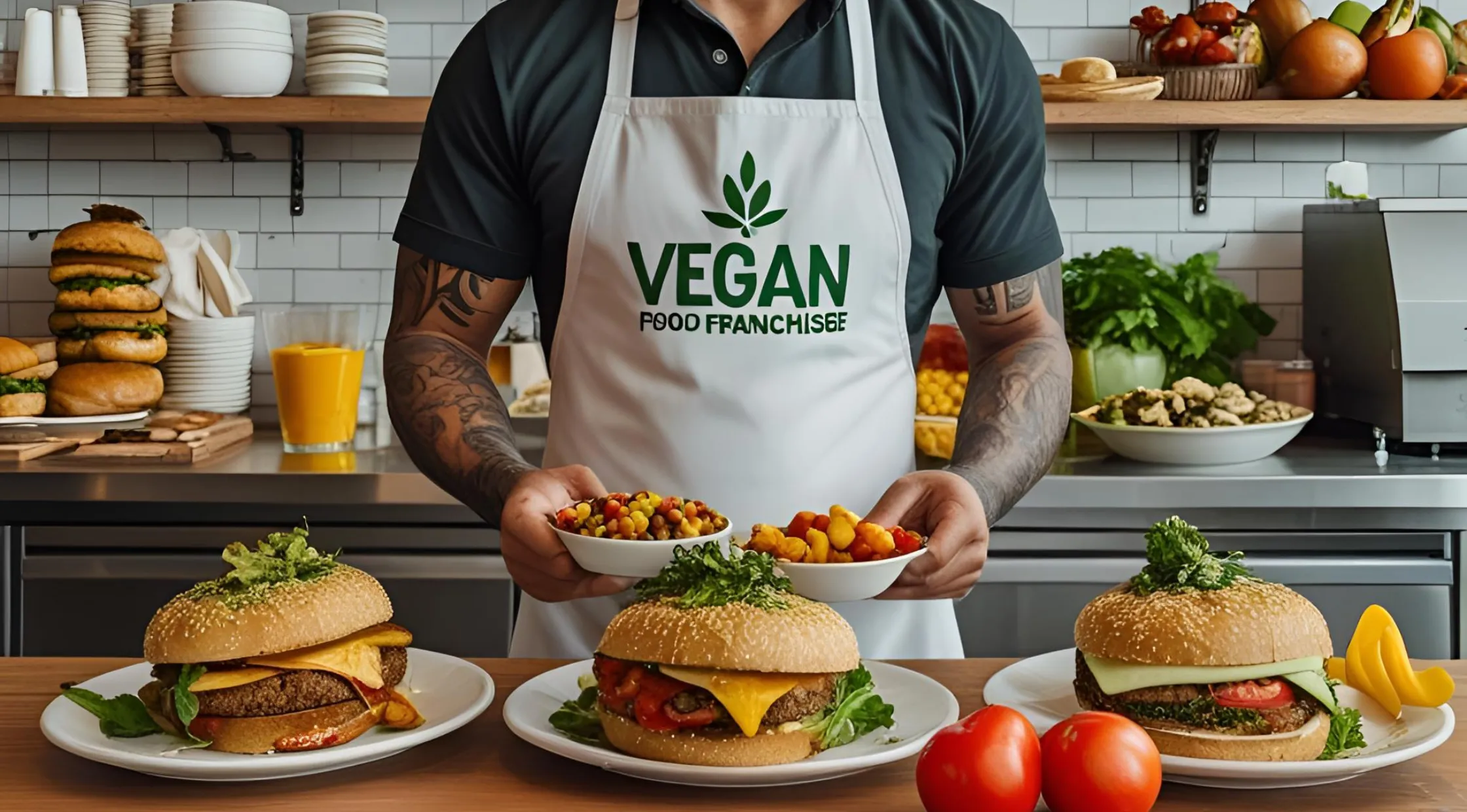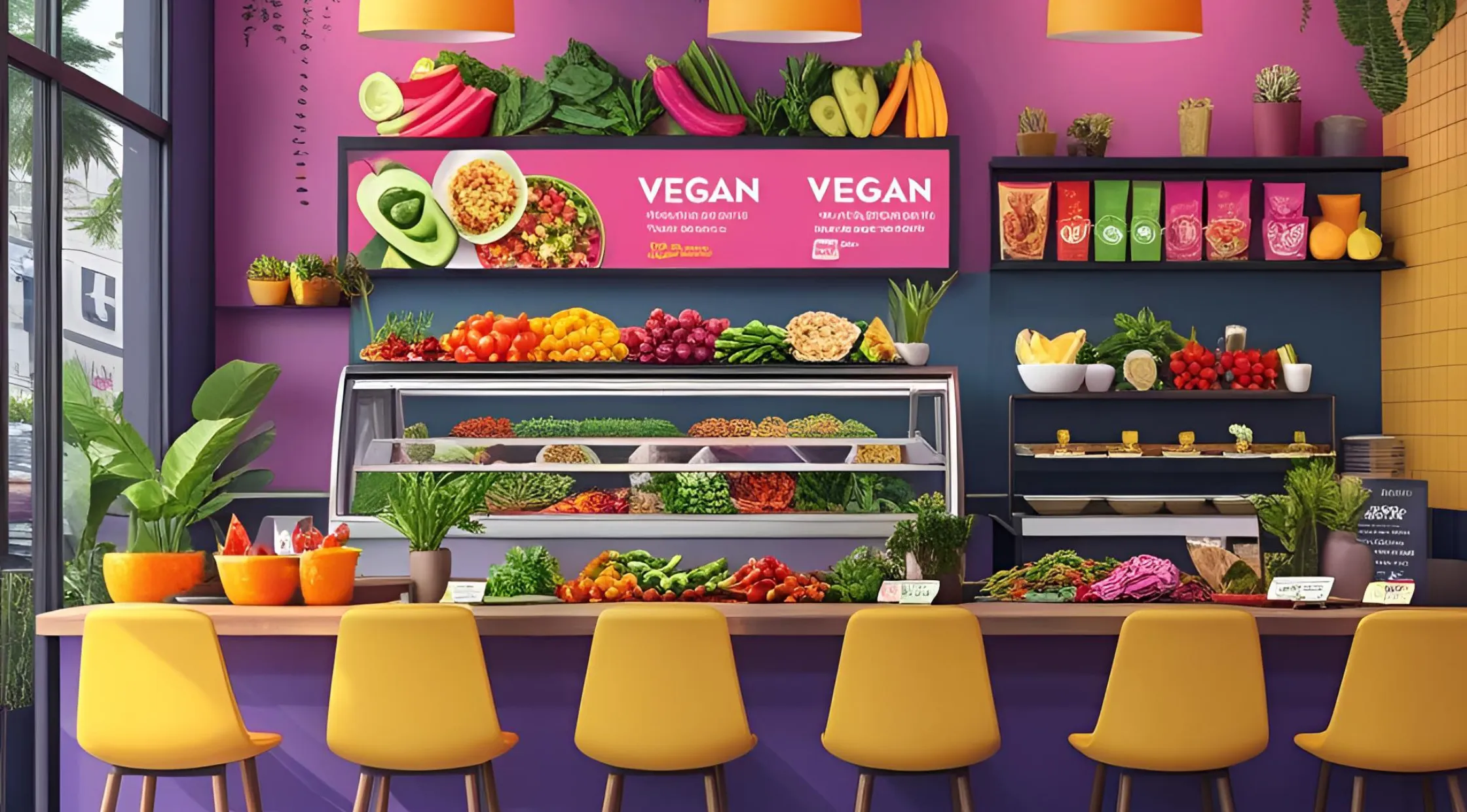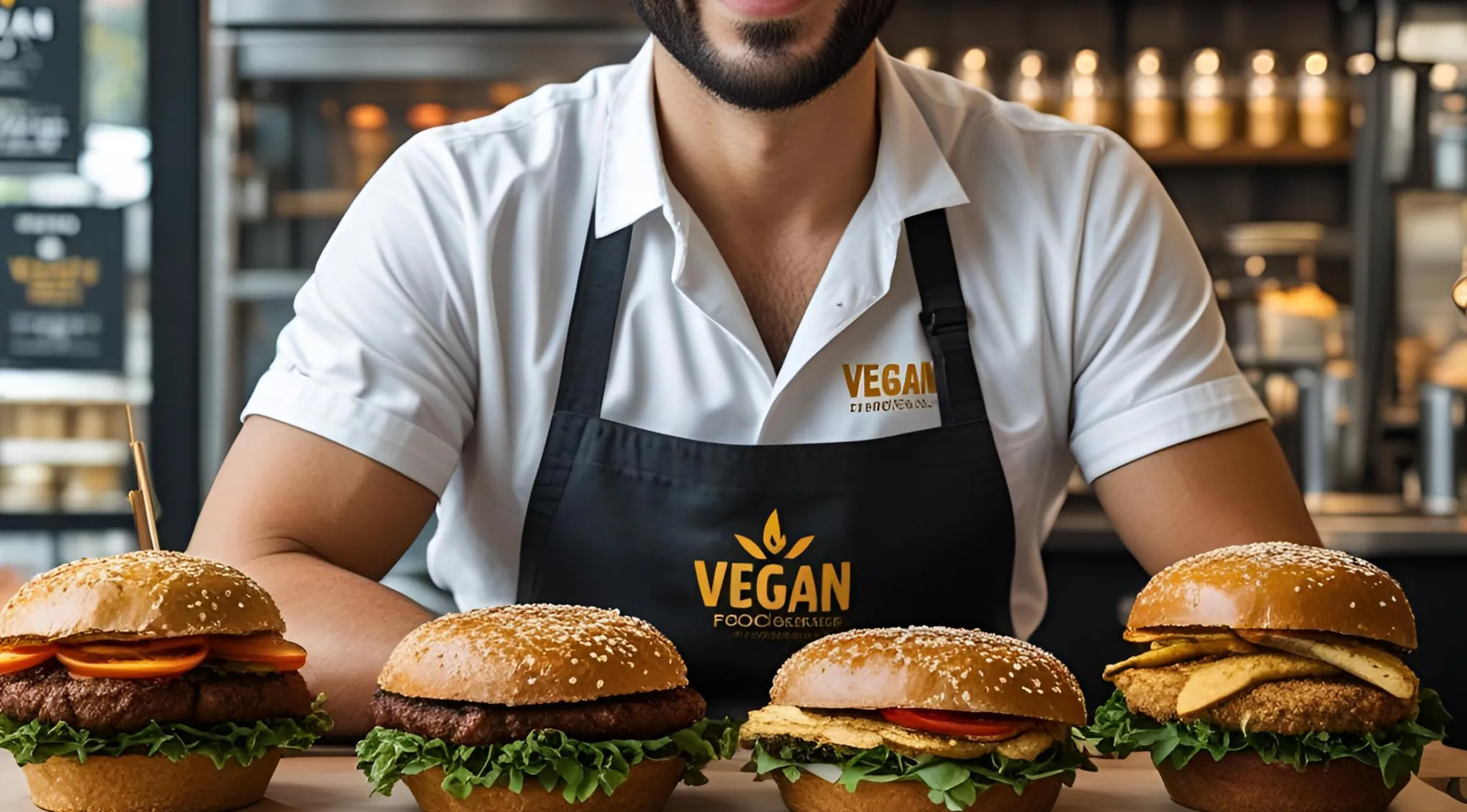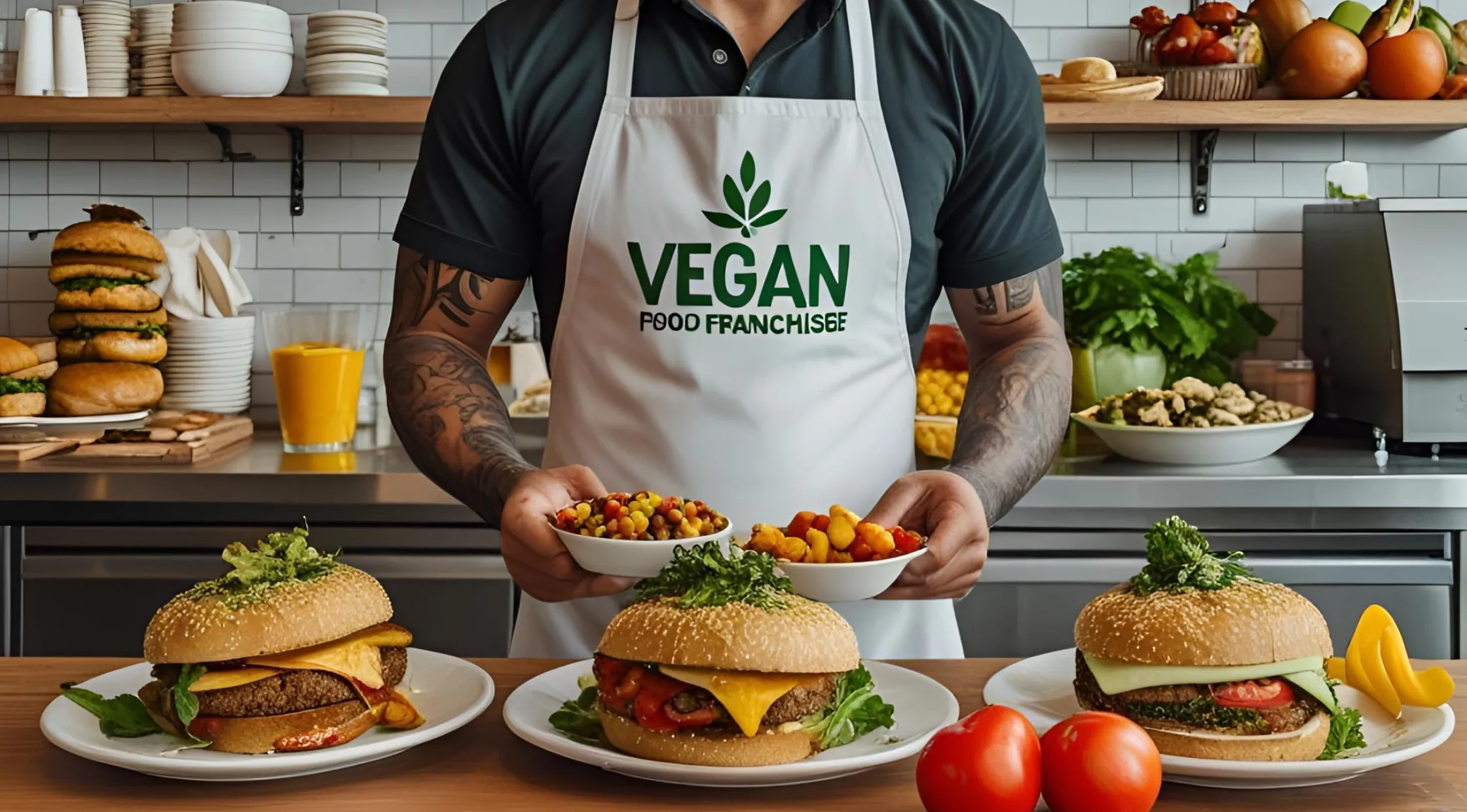Dentro del mundo de las franquicias de comida vegana: un mercado en auge
Franquicias de comida vegana!
Anuncios
El panorama culinario está atravesando un cambio radical, y el veganismo está pasando de ser un estilo de vida de nicho a un movimiento generalizado.
En el centro de esta transformación se encuentra el rápido ascenso de franquicias de comida vegana, un sector que no sólo está transformando los hábitos alimentarios sino que también redefiniendo las oportunidades empresariales.
A diferencia de las tendencias alimentarias pasajeras, el mercado de franquicias veganas está arraigado en una confluencia de motivaciones éticas, ambientales y de salud, lo que lo convierte en un modelo de negocio sólido y sostenible.
Franquicias de comida vegana

Anuncios
Este artículo profundiza en la dinámica de este mercado en auge, explorando sus impulsores de crecimiento, estrategias innovadoras y las oportunidades únicas que presenta tanto para inversores como para consumidores.
¿Por qué las franquicias de comida vegana están ganando tanta popularidad?
La respuesta está en una tormenta perfecta de factores culturales y económicos.
Los consumidores son cada vez más conscientes del costo ambiental de la ganadería; los estudios muestran que las dietas basadas en plantas pueden reducir la huella de carbono hasta en un 50%.
Mientras tanto, los comensales preocupados por la salud se sienten atraídos por la promesa de un colesterol más bajo, un menor riesgo de enfermedades crónicas y comidas vibrantes y ricas en nutrientes.
Para los empresarios, el atractivo es igualmente convincente: las franquicias ofrecen un modelo de negocio estructurado con reconocimiento de marca incorporado, evitando la incertidumbre de empezar desde cero.
Esta sinergia entre la demanda de los consumidores y la eficiencia operativa ha convertido a las franquicias de comida vegana en una mina de oro para inversores con visión de futuro.
Piense en el mercado de franquicias veganas como un ecosistema próspero, muy parecido a un arrecife de coral repleto de vida diversa.
++ Cómo las franquicias gestionan las diferencias culturales en los mercados internacionales
Así como un arrecife alberga una multitud de especies, las franquicias veganas atienden a un amplio espectro de consumidores, desde veganos acérrimos hasta flexitarianos que experimentan con opciones basadas en plantas.
Esta diversidad impulsa la innovación, con franquicias que experimentan con sabores audaces, prácticas sustentables y menús inclusivos que atraen a todos los paladares.
En este artículo, analizaremos los impulsores clave de este mercado, destacaremos dos conceptos de franquicia originales y abordaremos preguntas comunes para ilustrar por qué las franquicias de comida vegana no son solo una tendencia, sino una fuerza transformadora en la industria alimentaria.
El auge de las franquicias de comida vegana: un mercado impulsado por la demanda

El aumento de las franquicias de comida vegana no es casualidad; es una respuesta directa a un cambio global en el comportamiento del consumidor.
Según un informe de Statista de 2023, se proyecta que el mercado mundial de alimentos de origen vegetal alcance los $77.8 mil millones para 2025, con una porción significativa impulsada por modelos de servicio rápido y franquicia.
Este crecimiento está impulsado por un grupo demográfico más joven, la Generación Z y los Millennials, que priorizan la sostenibilidad y la ética en sus decisiones de compra.
En consecuencia, las franquicias que antes se centraban en menús con alto contenido de carne están cambiando de rumbo e integrando opciones veganas o lanzando conceptos totalmente basados en plantas para capturar este lucrativo mercado.
Además, la accesibilidad a las franquicias veganas está transformando la cultura gastronómica.
A diferencia de los restaurantes veganos independientes, que a menudo atienden a una clientela urbana y adinerada, las franquicias democratizan el acceso a alimentos de origen vegetal.
Desde centros comerciales suburbanos hasta bulliciosos centros urbanos, marcas como estas están llevando el veganismo a las masas.
Esta expansión está respaldada por sofisticadas cadenas de suministro que garantizan una calidad constante, desde ingredientes de origen ético hasta envases ecológicos.
Como resultado, las franquicias no sólo alimentan una tendencia sino que fomentan un cambio cultural hacia una alimentación sustentable.
Sin embargo, el ascenso no está exento de desafíos.
Ampliar una franquicia vegana requiere navegar en un panorama complejo de escepticismo del consumidor, logística de la cadena de suministro y preferencias de sabor regionales.
Sin embargo, las franquicias exitosas son aquellas que convierten estos desafíos en oportunidades, aprovechando la tecnología para operaciones eficientes y el marketing para educar a los consumidores.
¿No es fascinante cómo un modelo de negocio puede simultáneamente alimentar a la gente, proteger el planeta y obtener ganancias?
La respuesta está en la brillantez estratégica de estas franquicias, que exploraremos a través de dos ejemplos innovadores.
Tabla: Factores clave del crecimiento de las franquicias de comida vegana
| Factor | Impacto en el mercado | Ejemplo |
|---|---|---|
| Demanda del consumidor | Creciente interés en las dietas basadas en plantas entre los Millennials y la Generación Z. | Aumento de las ventas de artículos de comida rápida veganos, como hamburguesas y bowls. |
| Conciencia ambiental | La creciente preocupación por el cambio climático impulsa la demanda de opciones alimentarias sostenibles. | Franquicias que adoptan embalajes sin residuos y abastecimiento local. |
| Tendencias de salud | Las dietas veganas se asocian a menores riesgos de enfermedades cardíacas y diabetes. | Elementos del menú que destacan superalimentos como la quinua y la col rizada. |
| Modelo de negocio escalable | Las franquicias ofrecen consistencia de marca y apoyo operativo para una rápida expansión. | Acuerdos de franquicia multiunidad en mercados suburbanos y urbanos. |
Conceptos innovadores de franquicias veganas: dos ejemplos originales

Para ilustrar la creatividad que impulsa este mercado, exploremos dos conceptos originales de franquicias de comida vegana diseñados para captar diversos segmentos de consumidores.
Estos ejemplos resaltan cómo la innovación, la adaptabilidad y la autenticidad impulsan el éxito de las franquicias veganas.
Cuencos GreenWave
GreenWave Bowls es un concepto de franquicia centrado en bowls veganos personalizables y ricos en nutrientes que combinan sabores globales con ingredientes locales.
Cada ubicación cuenta con una estación “Build-Your-Bowl” donde los clientes eligen entre bases como quinoa o arroz de coliflor, proteínas como tempeh marinado o yaca y aderezos que van desde kimchi hasta crema de aguacate.
Lo que distingue a GreenWave es su modelo de abastecimiento hiperlocal: los franquiciados se asocian con granjas cercanas para garantizar ingredientes frescos y de temporada, reduciendo la huella de carbono y apoyando las economías locales.
Además, GreenWave utiliza tableros de menú controlados por IA que sugieren combinaciones según las necesidades dietéticas, lo que lo convierte en un éxito entre los comensales preocupados por la salud.
El modelo operativo de la franquicia es igualmente innovador.
GreenWave emplea diseños de cocina modulares que minimizan los residuos y el uso de energía, lo que permite a los franquiciados operar en espacios más pequeños, perfectos para mercados urbanos o camiones de comida.
Además, su aplicación de fidelización gamifica la experiencia gastronómica, recompensando a los clientes por elegir opciones sostenibles como cuencos reutilizables.
Al combinar tecnología, sustentabilidad y sabores audaces, GreenWave Bowls atrae a un amplio grupo demográfico, desde ecologistas hasta profesionales ocupados que buscan comidas rápidas y saludables.
Café Urban Sprout
Urban Sprout Café adopta un enfoque diferente y se centra en cafés veganos acogedores e impulsados por la comunidad que también funcionan como centros sociales.
Cada ubicación presenta un diseño minimalista con madera recuperada y paredes de plantas vivas, creando un ambiente acogedor para profesionales y estudiantes que trabajan desde casa.
El menú enfatiza la comida reconfortante reinventada como vegana, con platos como pasteles de “carne” a base de hongos, pizzas con queso y anacardos y postres decadentes a base de plantas.
Urban Sprout también organiza eventos semanales como clases de cocina vegana y talleres de sostenibilidad, fomentando un sentido de comunidad y lealtad a la marca.
Lo que hace único a Urban Sprout es su sistema de apoyo a los franquiciados.
La marca ofrece una amplia capacitación en técnicas culinarias basadas en plantas, lo que garantiza la coherencia en todas las ubicaciones.
Además, su Fondo “Sprout” destina una parte de sus beneficios a iniciativas medioambientales locales, reforzando su compromiso con el impacto social.
Al combinar comida reconfortante con un espíritu emprendedor, Urban Sprout Café atrae tanto a veganos comprometidos como a omnívoros curiosos, lo que demuestra que comer a base de plantas puede ser a la vez placentero y útil.
Tabla: Comparación de GreenWave Bowls y Urban Sprout Café
| Característica | Cuencos GreenWave | Café Urban Sprout |
|---|---|---|
| Oferta principal | Bowls veganos personalizables con sabores globales. | Acogedora cafetería vegana con comida reconfortante y eventos comunitarios. |
| Público objetivo | Consumidores conscientes de la salud y en constante movimiento. | Comedores centrados en la comunidad, trabajadores remotos y estudiantes. |
| Propuesta de venta única | Abastecimiento hiperlocal y personalización del menú impulsada por IA. | Centro social con comida reconfortante e iniciativas medioambientales. |
| Innovación operativa | Cocinas modulares para eficiencia y sostenibilidad. | Amplios programas de formación para franquiciados y participación comunitaria. |
Desafíos y oportunidades en la expansión de franquicias veganas

Si bien el mercado de franquicias de comida vegana está prosperando, ampliar estos negocios requiere enfrentar un conjunto único de desafíos.
Un obstáculo importante es la percepción del consumidor. A pesar de la creciente aceptación, algunos comensales aún consideran la comida vegana insípida o demasiado cara.
Las franquicias exitosas contrarrestan esto invirtiendo en innovación de sabores: piense en especias intensas, ingredientes ricos en umami y platos visualmente impactantes que rivalizan con la comida rápida tradicional.
Además, las campañas de marketing que destacan la asequibilidad y la accesibilidad ayudan a disipar los mitos sobre el veganismo como un estilo de vida de élite.
Otro desafío es la complejidad de la cadena de suministro.
Las franquicias veganas dependen del acceso constante a ingredientes vegetales de alta calidad, que puede verse afectado por la disponibilidad estacional o problemas comerciales globales.
Sin embargo, las franquicias líderes están convirtiendo esto en una oportunidad al forjar alianzas con proveedores sustentables e invertir en integración vertical.
Por ejemplo, algunas marcas están experimentando con granjas hidropónicas internas para cultivar productos frescos, lo que garantiza la resiliencia de la cadena de suministro y el control de costos.
Este enfoque proactivo no sólo mitiga los riesgos sino que también mejora la credibilidad de la marca.
Finalmente, el panorama competitivo se está intensificando a medida que más actores ingresan al mercado.
Para destacarse, las franquicias deben diferenciarse mediante una marca única, experiencias de cliente excepcionales y compromiso con la comunidad.
La oportunidad radica en crear una base de clientes leales a través de contar historias que compartan el "por qué" detrás de la marca, ya sea el bienestar animal, el impacto ambiental o los beneficios para la salud.
Al abordar estos desafíos con creatividad y previsión, las franquicias de comida vegana están preparadas para dominar el sector de la comida rápida informal.
El impacto económico y social de las franquicias de comida vegana
Más allá de la rentabilidad, las franquicias de comida vegana están impulsando un cambio económico y social importante.
En términos económicos, están creando puestos de trabajo, desde gerentes de franquicias hasta chefs que trabajan con productos vegetales, al tiempo que estimulan la agricultura local a través de la demanda de productos frescos.
Socialmente, están normalizando el veganismo, haciéndolo más accesible a diversas comunidades.
Esta inclusión es fundamental para derribar barreras, ya que la alimentación basada en plantas se convierte en una opción viable para personas de todos los niveles de ingresos y orígenes culturales.
Además, estas franquicias son catalizadores del progreso ambiental.
Al priorizar prácticas sustentables como envases compostables y cocinas energéticamente eficientes, están reduciendo la huella ecológica de la industria alimentaria.
Por ejemplo, una sola franquicia vegana puede ahorrar miles de galones de agua al año en comparación con un establecimiento de comida rápida tradicional, gracias a las menores demandas de recursos de los ingredientes de origen vegetal.
Esta alineación con los objetivos globales de sostenibilidad resuena tanto entre los consumidores como entre los inversores, creando un círculo virtuoso de crecimiento e impacto.
El impacto social también se extiende a la educación. Muchas franquicias ofrecen recursos como guías nutricionales o clases de cocina, lo que permite a los consumidores tomar decisiones informadas.
Esta función educativa posiciona a las franquicias veganas como líderes en el movimiento más amplio de justicia alimentaria, abogando por un sistema que priorice la salud, la equidad y la sostenibilidad.
A medida que estas empresas crecen, no solo sirven comidas, sino que también están dando forma a una cultura alimentaria más consciente.
Tabla: Beneficios económicos y sociales de las franquicias de comida vegana
| Beneficio | Descripción | Impacto |
|---|---|---|
| Creación de empleo | Genera empleo en operaciones de franquicia y cadenas de suministro. | Estimula las economías locales y apoya a las comunidades agrícolas. |
| Sostenibilidad ambiental | Reduce la huella de agua, tierra y carbono en comparación con las franquicias basadas en carne. | Se alinea con los objetivos climáticos globales y atrae a consumidores con conciencia ecológica. |
| Cambio cultural | Normaliza el veganismo a través de opciones gastronómicas accesibles y atractivas. | Amplía el atractivo de las dietas basadas en plantas entre diversos grupos demográficos. |
| Participación comunitaria | Ofrece programas educativos y asociaciones locales. | Fomenta la información de los consumidores y fortalece los lazos comunitarios. |
Preguntas frecuentes sobre franquicias de comida vegana
Para abordar curiosidades e inquietudes comunes, aquí hay una tabla que responde preguntas clave sobre las franquicias de comida vegana, brindando claridad para posibles inversores y consumidores curiosos.
Tabla: Preguntas frecuentes
| Pregunta | Respuesta |
|---|---|
| ¿Qué diferencia a las franquicias veganas de las tradicionales? | Las franquicias veganas se centran en menús basados en plantas, prácticas sustentables y marcas éticas, atrayendo a un grupo demográfico creciente de consumidores conscientes. |
| ¿Son rentables las franquicias veganas? | Sí, dado que se proyecta un crecimiento significativo del mercado de productos de origen vegetal, las franquicias se benefician de la alta demanda y de modelos escalables. La rentabilidad depende de la ubicación y la ejecución. |
| ¿Necesito ser vegano para tener una franquicia? | No, los franquiciados no necesitan ser veganos, pero comprender la filosofía y las tendencias del mercado es crucial para el éxito. Los programas de capacitación suelen abarcar los principios veganos. |
| ¿Cómo garantizan las franquicias la calidad de los ingredientes? | Muchos se asocian con proveedores locales o certificados y utilizan tecnología para monitorear las cadenas de suministro, garantizando ingredientes frescos, éticos y consistentes. |
| ¿Pueden las franquicias veganas resultar atractivas para los no veganos? | Por supuesto, al ofrecer platos sabrosos, asequibles y familiares, atraen a flexitarianos y omnívoros, ampliando su base de clientes. |
Conclusión: El futuro de las franquicias de comida vegana
El mercado de franquicias de comida vegana es más que una tendencia comercial; es una revolución cultural y económica.
Impulsadas por la demanda de los consumidores, la urgencia ambiental y modelos de negocio innovadores, estas franquicias están redefiniendo la comida rápida informal.
Desde tazones personalizables hasta cafés comunitarios, están demostrando que la comida de origen vegetal puede ser deliciosa, accesible y rentable.
A medida que el mercado continúa creciendo, la pregunta no es si las franquicias veganas tendrán éxito, sino hasta qué punto transformarán el panorama alimentario mundial.
Tanto para los empresarios como para los consumidores, ahora es el momento de sumergirse en este ecosistema vibrante y próspero.
